When it comes to building a website, one of the most important decisions you'll make is choosing a hosting plan. The right web hosting will ensure that your website is fast, reliable, and easy to manage — while the wrong one can lead to a variety of problems you don’t need. In this article, we'll explore the different options available and provide tips for choosing the best hosting plan and provider for your needs.
By the end of this article, you'll have a clear understanding of what to look for in a hosting plan and how to make the best hosting decision.
Best web hosting in India
Before jumping into the list of web hosting providers in India, let's first understand what web hosting is.
What is web hosting?
You're probably familiar with the term "web hosting," but what does it actually mean?
Web hosting is a service that allows you to share your website with the world.
A website is just a collection of text and photo files. If you want people to see your site, there has to be someplace online where those files are stored.
That place is called a web server, and it's usually managed by a web hosting provider (also known as a web host). Visitors won't be able to see or use your website without this server.
Web hosting accounts come with tools and utilities that can help make managing your website easier.
While it is possible to operate your own server, most businesses find this too expensive. Instead, they rent space on servers maintained by a hosting company.
Such companies often own large networks of servers known as data centres. For example, GoDaddy owns data centres all over the world. This allows them to offer their web hosting services at an affordable price point compared to other providers.

Web hosting is one of the most important aspects of running a website. A good web host can help increase your site’s security and speed, to enhance user experience.
A poor web hosting provider can mean your website is slow to load or regularly unavailable to your customers.
1. GoDaddy
GoDaddy is one of the largest web hosting providers in the world. It offers a wide range of web hosting plans and services and has a customer base of more than 21 million globally.
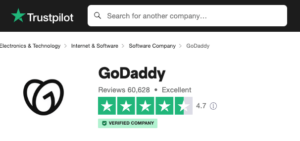
They offer different hosting plans for everything from small businesses to large corporations.
Below mentioned are a few of the benefits you get when you choose to go ahead with GoDaddy as your web hosting provider.
GoDaddy provides excellent customer support
Located right here in India, GoDaddy’s award-winning support team is ready day and night. Highly trained GoDaddy Guides provide fast, friendly answers in English, Hindi, Tamil, Telugu and Marathi.
It's important to choose a web hosting provider that offers 24/7 help.
Customers enjoy round-the-clock help via:
- Live chat
- Phone
- Email support
They also have a knowledge base and community forum where you can find answers to common questions.
Great uptime and server speed
Another reason GoDaddy is the best web hosting provider in India is that it provides a 99.9% uptime guarantee, which means it’s very reliable and secure.
With our latest optimized server hardware, you'll get faster sites — up to nearly 40% average improvement in overall server response times.
- Non-Volatile Memory Express (NVMe) Solid State Drives (SSDs)
Get up to a 7x throughput boost2 with our server NVMe SSDs for resource-intensive websites.
- PHP OPCache
PHP scripts are executed once, then stored in memory for up to 33% faster server response times.
- Substantial I/O Resources
Get faster queries of large databases and help prevent slow loading websites — with 10MB/s of I/O.

A loading time of more than three seconds may get you a high bounce rate, as most people won’t wait longer than this for a web page to load. Having your site hosted out of GoDaddy’s India data centre can improve:
- Speed
- Performance
- Security of your website
It may also improve your site conversion rates — in other words, the number of people who request a quote, sign up for your newsletter or make a purchase.
GoDaddy provides easy to use Control Panel
GoDaddy’s Control Panel is easy to use, customizable, and offers many features. It works with almost all the popular CMS (content management systems) and has a strong support system in place.
You can easily manage your website through your Control Panel as it provides an intuitive interface. Here you can:
- Create email accounts
- Manage DNS records
- Add subdomains or parked domains
- Set up FTP accounts
- Manage daily backups
GoDaddy India comes with lots of security features
GoDaddy India is a secure web hosting provider. The company complies with industry standards and offers free malware scanning and removal, daily backups and DDoS monitoring. Their Economy, Deluxe and Ultimate web hosting plans include free SSL certificates.
Related: National cybercrimes are on the rise — tips to protect yourself
All you need to get (and keep) your business online
GoDaddy offers a complete set of tools for doing business online. Apart from website hosting, GoDaddy also offers:
- Domain names (find out how to get a free domain with hosting)
- Easy website and e-commerce store builders
- Inexpensive business emails (free with hosting)
- Website security tools (daily backups free with hosting)
- Digital marketing tools
- Free customer management tools for web developers
With GoDaddy Website Builder you can choose any pre-built template and create a modern, mobile-friendly website for free — no technical skills needed!
For those who prefer to use WordPress to build their websites, GoDaddy offers one-click WordPress setup. They also offer managed e-commerce WordPress hosting with WooCommerce, free SSL, your own domain, business email, backups and a staging site.

Easily upgrade your hosting plan as your needs change
GoDaddy offers tiered pricing for web hosting plans that offer different amounts of storage, bandwidth, disk space, email accounts, and more.
As your business grows, you can change to a more powerful plan without losing any data or experiencing site downtime.
30-day money-back guarantee
With a 30-day money-back guarantee, using GoDaddy's hosting services is a risk-free choice for your website. It will help you:
- Get online quickly
- Save time and money in the long run
- Provide a great experience for mobile users
- Get the help you need to keep your website up and running
2. Bigrock
Bigrock is also one of the leading web hosting providers in India. It offers shared, reseller, and VPS hosting plans.
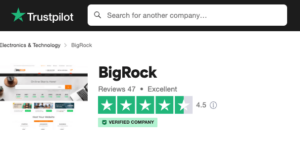
The company has a 24/7 support team that is available through email or phone for all your web hosting-related queries.
Bigrock also offers a 30-day money-back guarantee, which means you can try out their services before making a final decision to continue or not.
3. Bluehost
Bluehost was founded in 2003 by Matt Heaton and Danny Ashworth, two former Microsoft employees.
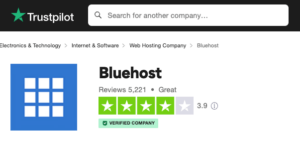
Since its inception, Bluehost has grown to become a global company with offices located in the United States, India, and Australia.
Bluehost offers shared, reseller, VPS, and dedicated hosting services with support via phone or email around the clock.
4. HostGator
HostGator is a web hosting company that offers a range of hosting plans to suit different needs and budgets. The company has been in business since 2002 and is known for its reliable and affordable hosting services. HostGator has offices in India, the USA, the UK, and Australia.
The company offers shared, VPS, dedicated, and cloud hosting, as well as domain registration and website builder services.
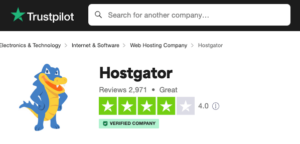
Hostgator India has a 99.9% uptime guarantee, ensuring that your website will be available to visitors around the clock.
The company also offers fast page load times, thanks to its use of high-quality hardware and its data centers located in India.
In terms of customer support, Hostgator offers 24/7 phone, live chat, and email support, as well as a knowledge base and community forum.
5. Hostinger
Hostinger India has a wide range of plans in their portfolio, and they offer different types of hosting solutions such as VPS, dedicated, reseller, etc.
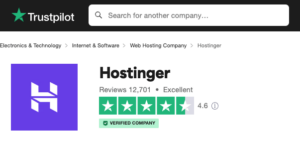
Hostinger has been in business for over 15 years. It also provides other services such as domain registration, SSL certificates, etc., along with hosting services.
Hostinger’s lowest shared hosting plan comes with limited storage and bandwidth. If you need higher storage and bandwidth, you can go with the Premium Plan.
Beginner’s guide to types of hosting plans
Web hosting is not a one-size-fits-all service. The best hosting plan for one website may be inadequate for another.
The best hosting plan for you is the one suited for the type of website you own and how much traffic it gets, among other factors. Here are the major types of web hosting:
Shared Hosting
Shared hosting is one of the most common and basic types of hosting. It's often the cheapest option, which makes it perfect for beginners or businesses with low website traffic.
Websites on shared hosting have to share resources with other websites, as they are all housed on the same server.
For many businesses, this is a good option as they don’t need a whole server for themselves.
Shared hosting is affordable because the websites are splitting resources and costs.
The downside is that if your website (or any website sharing the same server) has a sudden large spike in traffic, you may find yourself with slow page speeds or downtime. It is possible for shared servers to be overwhelmed by high demand.
Although it is the most economical and affordable hosting solution, it is not suited for websites with more than 20,000 visitors monthly.

Who is shared hosting for?
Shared hosting is a great choice for bloggers and small business owners who are just beginning. It’s cost-effective, low- maintenance, and doesn’t require technical knowledge to use.
You can opt for shared hosting if you’re not expecting more than 10,000 or 20,000 monthly visits to your website.
Shared web hosting pros:
- Least expensive
- Easy set-up
- No technical skills required
- Great for bloggers and basic business websites
- The best hosting providers include daily backups
Shared web hosting cons:
- Sharing server resources with other websites
- Performance issues if traffic peaks on any of them
- Less control over your site performance
If you start with shared hosting then find you need something more, simply upgrade your hosting plan.
WordPress Hosting
WordPress is a software that lets users build, edit and add content to their websites without coding. It is also widely used by web developers and designers to create websites for clients.
WordPress is one of the most popular builders, with over 43.2% of all websites built on it.
While WordPress itself is free, you’ll need to pay for hosting to make your new WordPress website visible to the world. The best hosting plans have one-click WordPress installation on the servers.
There are primarily two types of WordPress hosting:

- Shared WordPress Hosting
- Managed WordPress Hosting
Shared WordPress hosting is similar to the shared hosting we discussed earlier in this guide.
Managed WordPress hosting has added features that are specifically designed for WordPress websites. For example, GoDaddy’s fully managed WordPress hosting plans include:
- Pre-installed extensions, plugins and themes
- 24-hour malware scanning and removal
- Free professional email
- Free SSL security certificate
- A free domain name
- Website backup protection with one-click site restoration
GoDaddy’s Managed WordPress Hosting with WooCommerce makes it easy to sell anything, anywhere online — from physical products to digital downloads, services and subscriptions.
WordPress hosting usually has customized features that are specifically designed for websites hosted on WordPress. WordPress hosting also provides enhanced security features with other options like updates and backups etc.
Who is WordPress hosting for?

WordPress hosting is for websites built using WordPress. It is designed to enhance the performance of WordPress sites.
WordPress hosting pros:
- Optimized for WordPress
- The best hosting providers offer one-click WordPress installation
- Enhanced security
WordPress hosting cons:
- Less control
- Sharing resources with other sites
VPS (Virtual Private Server) Hosting
A VPS has independent resources, such as RAM and disk space. Unlike a shared server, a VPS is more powerful because it has its own operating system and CPU cores.
A VPS is essentially a virtual machine that allows you to have root access (the highest level of privileges).
It allows you to install any software or take full control over what happens on your site without having to worry about other websites negatively affecting your site’s performance.
In VPS hosting, the main server is split into multiple virtual servers and these virtual servers can be customized for individual websites.
You can also run custom configurations on your server, as you get root access with your VPS hosting plan.
Who is VPS hosting for?
VPS hosting is best for medium to large-sized businesses that can’t afford any downtime on their website — but don’t wish to pay for a more expensive dedicated server. It is also a great option for websites hosting large media files like videos and images.

VPS hosting pros:
- Your own server resources
- Can make custom configurations to your server
- Potentially higher uptime rates and faster loading speeds
- Less expensive than a dedicated server
VPS hosting cons:
- Sharing the main server with other websites
- Requires technical skills for setting up
Dedicated Hosting
Dedicated hosting is the most expensive type of hosting. It’s best for large companies and websites that get a lot of traffic. It offers you complete control over your server, which means you can install any software or add-ons that your website needs.
You don’t share resources with anyone, so you won’t experience slowdowns if there is any unexpected increase in visitor traffic.
Dedicated hosting is the best web hosting for heavy-load sites like:
- High-traffic e-commerce sites
- Media streaming sites (like YouTube)
Dedicated servers are the most premium choice in web hosting. However, the downside is that it is also the most expensive type of web hosting.
Dedicated hosting provides complete control over the server settings including the choice of configurations, software, installations, etc.
Who is dedicated hosting for?
Dedicated hosting plans are most suited for large e-commerce businesses or media streaming websites where the expected monthly visits are more than 100,000.

Businesses dealing with confidential financial or medical information should consider dedicated hosting.
Dedicated hosting requires a high level of technical skills to manage the servers. So if you don’t have these skills, you’ll need to hire someone to do this for you. Managing dedicated hosting involves proper installations, connections, updates, backups, etc.
Some hosting companies provide an option to the businesses to manage the servers on their behalf.
Dedicated hosting pros:
- Complete control over the server
- Highest security
- Fast load times and highest uptimes
Dedicated hosting cons:
- Most expensive
- Requires high-level technical skillsto manage
Cloud Hosting
Cloud hosting is the latest addition to the list of best hosting options. This type of hosting stores your website's files on clusters of remote servers in multiple data centers around the world.
Cloud hosting is much more secure than traditional shared or dedicated server hosting because it uses virtualization technology to separate neighboring websites from each other.
No one else can access your website’s virtual resources or data, even if their site is hosted on the same cloud cluster. If anything goes wrong with your server, it's the cloud provider that will take care of it for you.
Cloud hosting is an excellent way to host your site. It's more secure and can have better uptime than traditional shared hosting.
Who is cloud hosting for?
Cloud hosting may be the best hosting option for companies that are growing at a rapid rate and have to support high volumes of unpredictable traffic and fluctuating resource demands.
Any website with more than 50,000 monthly visits might consider a cloud plan.
Cloud hosting is a good, cost-effective alternative to VPS hosting.

Pros of Cloud hosting:
- High security
- Allows you to scale resources up or down as required
- Low unexpected downtime
Cons of Cloud hosting:
- Variable pricing
- Limited control as compared to VPS/dedicated hosting
Related: What every entrepreneur needs to know about cloud hosting
What to look for in web hosting
Choosing the best hosting service for your website can be a confusing process. There are so many options, and each one claims to offer all the features you need. But how do you know whether it’s right for you?
To make sure you a web host you’ll be satisfied with, we recommend keeping these things in mind:
Uptime
Reliability is perhaps the most significant factor to consider when choosing a web hosting provider. After all, what good is a website if it's not available to your visitors?
You want to choose a hosting provider having a strong track record for uptime, so you can be confident that your website will be available to your visitors when they need it.
It's important to understand what an uptime percentage actually means. Uptime means the percentage of time that your website is up and available. It measures how long your site has been online, or in other words, how long it took for your website to go down during your chosen period of measurement.
If you're only looking at hours, then 100% uptime would mean that your site never went offline in those 24 hours (which would be pretty amazing).
If you're looking at days, then 100% uptime means that there weren't any periods when the website was down for more than a second over those 24 days.
The industry standard and the uptime offered by the best providers is at least 99.9%.
Therefore, look for a provider who guarantees a minimum of 99.9% uptime.
Fast page loading
It is the most important factor to consider. Page loading speed has a direct impact on user experience, SEO and conversion rate. If your site takes too long to load, visitors might leave before it's even finished loading—and that’s no good for anyone!
Studies show that 1 in 4 users will abandon a website after waiting more than four seconds for a page to load.
You want to grow your business, therefore you need to make sure your website loads quickly so that website visitors can access information easily. If your customer base is in India, then for faster loading times, look for hosting providers who have data centers in India.
Scalability
Scalability refers to how easily additional resources can be made available as your business grows and your website becomes more popular.
How do you measure scalability? The easiest way is to look at the number of users or pages the web host can handle at peak times.

It's also important to consider how much disk space you'll need. This is especially true if you're planning on using video or audio files on your site, which can take up a lot of disk space.
You want a hosting company that offers high availability and redundancy. That way, if one server goes down for maintenance or repair, there's another server ready to take over immediately without impacting service for your site visitors.
Security
Security is another crucial factor to consider when choosing a web hosting provider.
Your website is likely to contain sensitive information, whether it's:
- Personal data such as banking details and passwords from your visitors
- Confidential business documents or secrets
It's important to choose a host that takes security seriously and offers features like SSL certificates and regular backups to help prevent (and recover from) data breaches.
The more secure your site is, the more trustworthy it will be.
There are many types of SSL certificates — there are even free SSLs for those who have root access to their websites and the knowledge to install them. But all of them can help keep thieves from stealing private data like banking details from your website.
The best web hosting providers offer free SSL certificates. With SSL certification your users can trust browsing your website and sharing their personal data without hesitation.
Backups
A backup is a copy of your website that you can be used to restore it if anything happens to your live website. It's important to have one because it protects you against data loss and allows you to recover quickly from an attack or hack.
Backup frequency depends on how often your content changes and how important that content is to your business. Common backup frequencies include daily, weekly and monthly backups.
You should always have at least two backups of your entire site:
- One locally, on your computer or server
- Another offsite in case something happens with the first one (you accidentally delete it, there’s a server crash, etc.)
Try to choose a hosting provider that provides automatic scheduling of backups so that there is no loss of data if your site crashes or gets hacked.
Support
Things can go wrong with a website, and when they do, you want to be able to get help quickly.
Good tech support is critical — choose a provider that has 24/7 tech support in India.
It is also equally important to choose the provider based on the knowledge resources available for that platform. These resources help you to navigate through the regular tasks of updates, backup, installations, etc., and save your time in troubleshooting.
Best hosting providers like GoDaddy provide round-the-clock support on call, email, and live chat in English and multiple local languages.
Pricing
Pricing is also an important factor to consider when choosing a web host. Different providers offer various pricing plans. It's important to choose one that fits your budget and meets your needs.
Be sure to also consider any hidden fees that may not be immediately apparent, as these can add up over time. Most web hosts offer multiple tiers of pricing so that you can increase your hosting resources as you grow your business.
Tips on getting the most from shared hosting
If you're in the market for a new website and have a limited budget, a beginner shared hosting plan may be your best choice. They give you all the necessary tools to launch your site, and they don't cost much.
As a website owner, you want your website to load quickly and provide a good user experience.
However, if you want to optimize your website's performance beyond what a shared host offers — like compressing images for faster loading or installing software that monitors traffic sources — you might need to pay more for some services.
In this section, we'll explore how simple adjustments can make it easier to keep your website running smoothly without paying extra each month.
Keep your website clean and simple
The first thing you should do to optimize your site is to clean it up. Delete any:
- Unused plugins
- Old themes
- Widgets you no longer need
These will take up resources that could benefit your website's performance.
It's also important to remove any unused pages from your site (such as an "About" page that might be empty).
However, be careful about removing things like navigation menus or footer links — these can help make it easier for visitors to find what they need on your site!
Enable caching
Caching is a powerful way to improve the performance of your website. It means that instead of your server having to generate web pages from scratch each time they're requested, it will simply load them from its memory cache instead.
If someone visits the same page more than once during their visit, it can be loaded at a much faster speed.
Caching is a solution for many of your performance challenges. It can help you make your website faster.
Different types of caching include:
- Site Cache
- Browser Cache
- Server Cache
- Micro Cache
Add pagination
Another handy trick is to add pagination to break up large blocks of content into smaller chunks.
Pagination will split up long posts into several pages so that the visitors don't have to scroll through endless amounts of text before finding what they're looking for on the web pages.
Install a CDN
A CDN is a Content Delivery Network. The purpose of a CDN is to deliver web content faster and more efficiently by distributing it across multiple servers across the globe.
It does this by serving your site’s static content from the server closest to the user, which reduces load times for people who are geographically farther away from your server location.
If you don't have access to a CDN already, getting one installed can be quite simple. Most shared hosting providers offer them as an add-on service or feature in their control panel.
Optimize images
Resizing and compressing photos and images is one of the easiest and most important things you can do to ensure your website performs well.
If a visitor’s browser has to download more than 50 images, page load time can increase by as much as 20%.

There are three main elements that go into image optimization:
- File format
- File size
- Image name
Use a free tool like GoDaddy Studio to resize photos, then a tool like compressjpg to compress each image before uploading it to your website.
Limit embedded content
Limiting embedded content is essential is another way to increase speed of your website.
When you embed videos, maps, and other elements on your website that are loaded from a third-party server, they are often the most resource-intensive and can slow down your site drastically.
To limit embedded content:
- Limit the number of widgets you use on your site, as each one increases page loading time. W3 Total Cache allows you to do this with just one click on WordPress websites.
- If you're using Google Fonts, reduce their size in pixels or load them only when necessary so the browser doesn't have to load them for every single page request (which will increase loading time). You can do this using a .htaccess file or plugins like W3 Total Cache or WP Super Cache.
As you can see, it’s not hard to optimize a website running on shared hosting. You just need to be willing to make some changes.
We hope these tips have helped you understand what tweaks are possible with your website and how they can improve performance for those who use it.
How to move a website to new web host
Migrating your website to a new web host is usually a simple process, but it should always be done by following a proper process.
Have a WordPress website? You can migrate it to GoDaddy web hosting using their free Site Auto Migration Tool.
Follow these five steps to ensure that migration goes smoothly and doesn't annoy visitors or impact your search rankings:
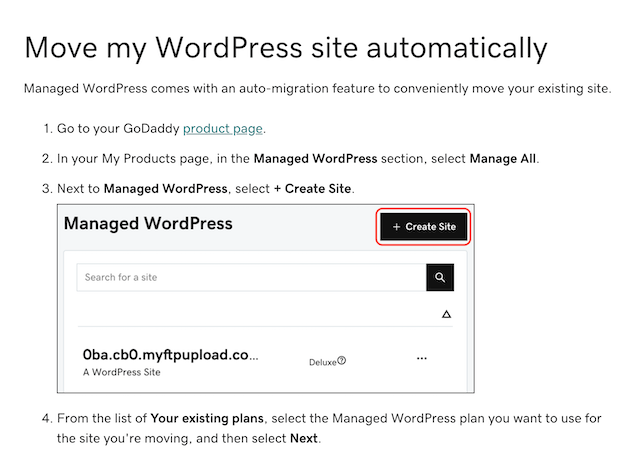
1. Check compatibility between new and old web host
If you're migrating a site from one web host to another, it's important to make sure that the two hosts are compatible. The two most important things to check are:
- The operating system. If both servers use the same operating system (e.g., Linux or Windows), then the process of migration is simple. If they're using different operating systems, however, they'll need an intermediate program called a Virtual Machine (VM) in order for them to communicate with each other and allow file transfers between them.
- The versions of PHP and MySQL used by each server. If both servers use the same versions of these software, then migration will be seamless. If not — for example, if one uses 5.1 while another uses 5.0 — then there may be problems when trying to transfer files between them. Some features may not work properly on either side due to differences in their respective coding structures.
2. Create backup
Before you migrate your website, it's critical to make a copy of the website on your existing web host.
Backups can help to restore the site if anything goes wrong during migration.
Recommended storage locations for backups include local hard drive or cloud-based storage (such as Dropbox, or Google Drive). This is fairly a straightforward way to store backups of your website files.
You can also use a service like UpdraftPlus Backup Pro Premium Plugin (for WordPress).
3. Update your domain name server
To update your domain name server (DNS), you'll need to visit the settings page of your domain registrar.
In the settings section, look for a section labeled DNS Settings or something similar. If you see such a section, click on it and then make sure you have an option for updating DNS records attached to your account. You'll need to manually update them using instructions from both your old and new hosts.
4. Upload your web files to the new web host
Now that you have the backup and domain name sorted, you can upload your website's files to the new web host.
Step one is to export all site data before uploading it to the new host's servers.
Once the previous steps are complete, import your data into the new site's server by logging into your account on their control panel and following their instructions for importing a file or directory (usually called FTP).
You can contact customer support directly, and they should be able to help you with this step if needed!
5. Test your website thoroughly
Once you've successfully migrated your website, it's time to test it.
- Check if everything is working as expected. It means testing all the pages, links, forms, and scripts on your new web host.
- Verify that there aren't any broken images or missing files.
Some web hosting providers provide paid services for migrating your website to their servers (GoDaddy provides a free migration service for WordPress websites).
By following the above steps, you can easily migrate your website. Simply contact tech support if you get stuck somewhere.
Why does my business need a website?
Have you ever wondered how a website works for your business? How does it help with sales and marketing, and what are the benefits of having one?
I'll walk you through some of the biggest benefits and show you how websites can help drive revenue in your business.
A website can be your 24/7 salesperson

A website is a 24/7 salesperson who never sleeps. It’s there for your customers whenever they choose to visit, whether it's late at night or the middle of the day. The best part? You don't even have to be present!
For example, e-commerce websites help business owners sell their products from their online stores — even while they sleep.
Did you know India is the eighth largest market for e-commerce, with revenue of US$85.4 billion in 2021?
It provides credibility
The most important thing having a website does for you is to provide credibility. It shows that you are serious about your business and have invested in it.
Your customers can see that you're not just another person selling products from their garage or basement, but rather an established company with the resources to create a professional-looking web presence.
Related: Make a good impression with professional email
 It lets you collect email addresses
It lets you collect email addresses
You can use opt-in forms to collect email addresses from your website to send out newsletters, marketing material, and promotional offers.
Email marketing is one of the least expensive and most effective marketing tools you have.
You can use those same email addresses to send surveys and feedback requests.
Related: 5 email marketing templates you can plug and play
It can attract new business
A website can be used to advertise your business and bring traffic to your physical location. It can also be used to:
- Generate leads
- Build a community around your business
- Sell products and services
It's a great way for any company to provide information about their location, business hours, products, or services in an informative format that is easily viewed on any device.
It can present special offers or coupons
Coupons and discounts are a great way to attract new customers and reward existing ones.
You can use coupons to increase sales.

For example, if you have an online store that sells designer clothing, you might offer a coupon for 10% off when someone buys something from the store. It is easy to implement offers and market them with your website.
Offer coupons on special occasions like holidays and discounts on birthdays. Giving loyal customers an incentive will make them feel appreciated and more likely to visit again.
With a business website, you can also split-test different offers or content in order to better understand how people react to each of them.
It serves as a database of knowledge
Your website is an always-on online resource to:
- Showcase your business
- Help answer questions for potential customers
It's an easily accessible database of knowledge for existing customers. Your site acts as a resource for them to learn more about your products, services, or even industry trends.
It also helps you improve your business by allowing you to see what people are saying about your brand online and how they're responding to different marketing campaigns — both positive and negative feedback is valuable here!
You can analyze data from your website
Thanks to tools like Google Analytics, you can analyze data from your website to improve your marketing campaigns.
You can see what your customers like, don't like and what they are looking for on your website.

This information can help you improve the product/service you sell and make it easier for people to find what they need on your site, leading to more sales and happier customers.
A website can do a lot for your business. It’s a place to showcase the products or services you’re offering, and it helps people find out more about what you have to offer.
It also lets them contact you and get answers to any questions they might have about your company or products.
Find the best hosting for your business
Now that we have covered the basics of what qualifies for the list of best hosting providers, you should be ready to make your own decision.
With all this information at your fingertips, it should be easy for you to find the right plan for your needs and budget.
The most important thing to remember when choosing a web hosting plan is that you should never compromise on quality. To ensure that your site stays up and running, you should always go with a reliable company you can trust.
Frequently Asked Questions (FAQs) about choosing your web hosting
Q: Which hosting server is best?
Ans: First, consider the purpose of your website. Do you need a simple personal blog or portfolio, or are you building a large e-commerce site with many pages and features?
The size and complexity of your website will determine the type of hosting plan you need.
Dedicated hosting servers offer the fastest load times and performance. But dedicated servers are the most expensive ones too. It really depends on the requirement to finalize the web hosting that is best for your website.
- Small businesses or bloggers with WordPress sites will find WordPress hosting most suited to their needs.
- Small businesses and individuals with sites built using other builders are safe starting out with shared hosting.
- Large corporations with massive media files can choose VPS hosting.
- Businesses dealing with confidential financial or medical information will want to consider dedicated hosting.
Q: Which hosting is best for website in 2024?
Ans: GoDaddy is the biggest web hosting provider in the world. It offers a wide range of web hosting services and has a large customer base across the globe.
It also gets excellent ratings — 4.7 out of five stars — from the 60,000+ customers who’ve rated it on Trustpilot.
GoDaddy now has a hosting center in India to provide better loading time and security to Indian business owners. This is particularly important to any business that serves clients and customers who are located in India, as physical proximity to the data centre typically speeds website loading times for site visitors.
GoDaddy offers best-in-class support, uptime, and security features for your website.
Q: What is the cheapest hosting plan?
Ans: Shared hosting is the cheapest hosting available for small websites. It is the most affordable option for those who are just starting out. If you're on a budget, shared hosting is the way to go.
But as a shared hosting user, it's important to keep in mind that you don't have exclusive access to the server. Think of it as renting space in a large hotel. The server you're using is likely hosting dozens of other websites.
There is a chance your website's loading speed could slow in the case of a traffic spike to one of the other sites on your server.
Q: Can you move your website from one hosting company to another?
Ans: Yes, you can migrate your website to another web hosting provider. Migration is not tricky, and we have discussed the five steps required for migration in this guide.
You can also reach out to tech support teams of both hosting providers if you’re stuck somewhere. Moving your current website to GoDaddy Web Hosting is also pretty simple.
As part of the new account onboarding process, you can migrate your WordPress website to a GoDaddy Web Hosting account using their free Site Auto Migration Tool.
Q: How can I upgrade my plan if I need to?
Ans: Most hosting providers give you the option to upgrade your plan from inside your dashboard.
Generally, plan upgrades result in zero downtime, which means that your website will remain operational throughout the upgrade. Choose one of the best hosting providers and you won't have to worry that your customers will be greeted by a 503 Service Unavailable server error. Such messages tend to hurt credibility.
Q: Can I host multiple websites in the same hosting plan?
Ans: It depends on the type of hosting plan that you have selected. Most starter plans are appropriate for only one website, but you can upgrade your plan to add multiple websites in the same hosting plan.
For example, with the GoDaddy Deluxe web hosting plan, you can easily include up to 10 websites in a single hosting plan.
Q: I have a blogging website. Which hosting plan should I choose?
Ans: If your website is built on WordPress, then WordPress hosting is what you should be looking for.
This type of hosting has customized features that are specifically designed for WordPress websites. GoDaddy’s fully managed WordPress hosting plans include:
- Pre-installed extensions, plugins and themes
- 24-hour malware scanning and removal
- Free professional email
- Free SSL security certificate
Our Managed WordPress Hosting platform with WooCommerce makes it easy to start selling anything, anywhere online – from physical products to digital downloads, services and subscriptions.
Q: How to connect a domain name with web hosting?
Ans: The most common way of connecting your domain name is by pointing it to the web hosting provider’s name servers.
Editor's Note: This article was first published on January 30, 2023 and updated on July 21, 2024.










